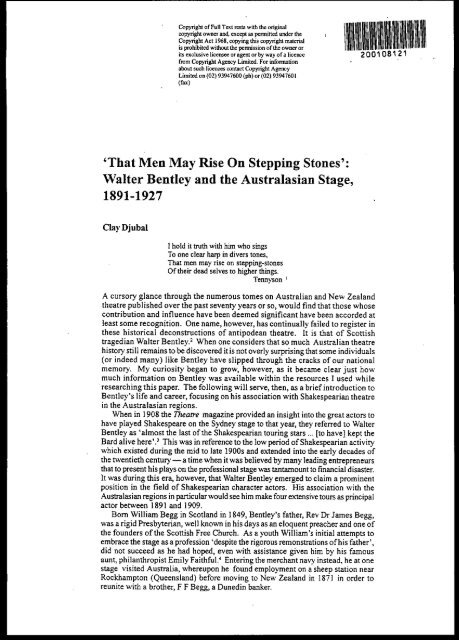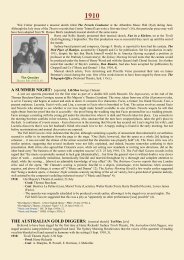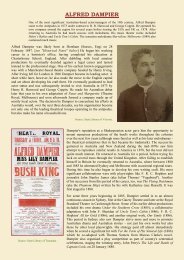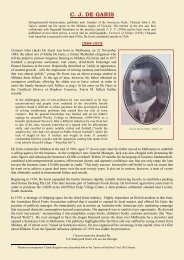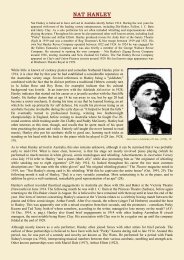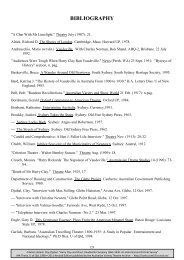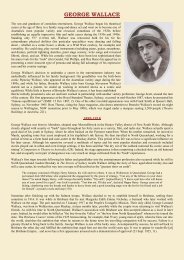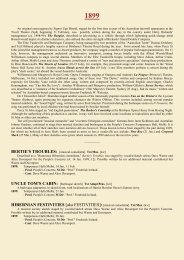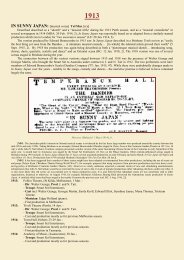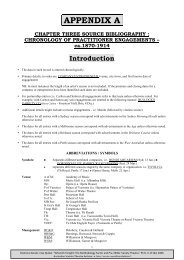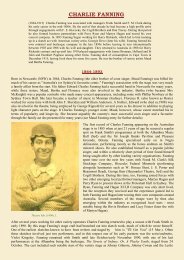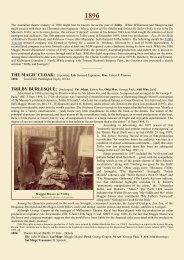Walter Bentley - Australian Variety Theatre Archive
Walter Bentley - Australian Variety Theatre Archive
Walter Bentley - Australian Variety Theatre Archive
You also want an ePaper? Increase the reach of your titles
YUMPU automatically turns print PDFs into web optimized ePapers that Google loves.
Copyright of Full Text rests with the original<br />
copyright owner and, except as pennitted under the<br />
Copyright Act 1968, copying this copyright material<br />
is prohibited without the pennission of the owner or<br />
its exclusive licensee or agent or by way of a licence<br />
from Copyright Agency Limited. For infonnation<br />
about such licences contact Copyright Agency<br />
Limited on (02) 93947600 (ph) or (02) 93947601<br />
(fax)<br />
'That Men May Rise On Stepping Stones':<br />
WaIter <strong>Bentley</strong> and the Australasian Stage,<br />
1891-1927<br />
Clay Djubal<br />
I hold it truth with him who sings<br />
To one clear harp in divers tones,<br />
That men may rise on stepping-stones<br />
Of their dead selves to higher things.<br />
Tennyson I<br />
A cursory glance through the numerous tomes on <strong>Australian</strong> and New Zealand<br />
theatre published over the past seventy years or so, would find that those whose<br />
contribution and influence have been deemed significant have been accorded at<br />
least some recognition. One name, however, has continually failed to register in<br />
these historical deconstructions of antipodean theatre. It is that of Scottish<br />
tragedian Waiter <strong>Bentley</strong>.' When one considers that so much <strong>Australian</strong> theatre<br />
history still remains to be discovered it is not overly surprising that some individuals<br />
(or indeed many) like <strong>Bentley</strong> have slipped through the cracks of our national<br />
memory. My curiosity began to grow, however, as it became clear just how<br />
much information on <strong>Bentley</strong> was available within the resources I used while<br />
researching this paper. The following will serve, then, as a brief introduction to<br />
<strong>Bentley</strong>'s life and career, focusing on his association with Shakespearian theatre<br />
in the Australasian regions.<br />
When in 1908 the <strong>Theatre</strong> magazine provided an insight into the great actors to<br />
have played Shakespeare on the Sydney stage to that year, they referred to Waiter<br />
<strong>Bentley</strong> as 'almost the last of the Shakespearian touring stars ... [to have] kept the<br />
Bard alive here'.' This was in reference to the low period of Shakespearian activity<br />
which existed during the mid to late 1900s and extended into the early decades of<br />
the twentieth century - a time when it was believed by many leading entrepreneurs<br />
that to present his plays on the professional stage was tantamount to financial disaster.<br />
It was during this era, however, that Waiter <strong>Bentley</strong> emerged to claim a prominent<br />
position in the field of Shakespearian character actors. His association with the<br />
Australasian regions in particular would see him make four extensive tours as principal<br />
actor between 1891 and 1909.<br />
Born William Begg in Scotland in 1849, <strong>Bentley</strong>'s father, Rev Dr James Begg,<br />
was a rigid Presbyterian, well known in his days as an eloquent preacher and one of<br />
the founders of the Scottish Free Church. As a youth William's initial attempts to<br />
embrace the stage as a profession 'despite the rigorous remonstrations of his father',<br />
did not succeed as he had hoped, even with assistance given him by his famous<br />
aunt, philanthropist Emily Faithful. 4 Entering the merchant navy instead, he at one<br />
stage visited Australia, whereupon he found employment on a sheep station near<br />
Rockhampton (Queensland) before moving to New Zealand in 1871 in order to<br />
reunite with a brother, F F Begg, a Dunedin banker.
Clay Djubal<br />
While little is yet known ofWilliam Begg's early days as an actor in New Zealand,<br />
it has been recorded that his first experience in the theatre occurred around 1872<br />
when he stepped into the breach for his brother, taking on the role ofMr Potter in an<br />
amateur production of Still Waters Run Deep.' The brother's fiancee apparently<br />
had such an aversion to anything theatrical that she threatened to break off their<br />
engagement unless he relinquished his involvement. Within a year William had<br />
taken the plunge and became a full-time actor. One of his earliest professional<br />
appearances is said to have been as St Leu in Love S Sacrifice, put on by a company<br />
run by English manager (and ex-actor) Clarence Holt in 1872 or 1873;6 and it is also<br />
reported that he not long afterwards took up the lease of the Princess <strong>Theatre</strong> in<br />
Auckland for a season in order to present his own productions.'<br />
In 1874 William Begg returned to Britain in order to advance his acting career,<br />
and it is also around this time that he began using the name Waiter <strong>Bentley</strong>. By 1876<br />
he had secured what was to become a three-year association with Henry Irving's<br />
Lyceum Company. During his time with Irving, <strong>Bentley</strong> was involved in several<br />
Shakespearian productions which would later become part of his standard repertoire,<br />
the most notable being Hamlet, in which he played Laertes (1876),' and Richard<br />
Ill, as Clarence (1877).' John Plummer, one of the founders of the London Figaro,<br />
records that Irving once spoke to him of his young protege, expressing the view that<br />
<strong>Bentley</strong> was a player of exceptional ability and that 'the British stage would be all<br />
the better for a few more men of his stamp' .'0<br />
<strong>Bentley</strong>'s promotion during his first <strong>Australian</strong> tour indicates that after Mrs<br />
Bateman and Irving dissolved their partnership at the Lyceum in 1878, he joined the<br />
former at Sadler's Wells and.at some stage toured the provinces as one of her<br />
company's senior players." Over the next few years he apparently played seasons<br />
in London, made regular tours throughout Britain for various companies, and<br />
eventually undertook a provincial tour of his own. It has been established, however,<br />
that <strong>Bentley</strong> spent some three years during the early to mid 1880s in the United<br />
States as principle actor in a company touring productions such as Burr Oaks, Love<br />
or Money and The Silver King, taking on the role of Wilfred Denver in the latter<br />
play for the Chicago season after Osmund Tearle's San Francisco engagement had<br />
ended." By most accounts it was his most popular non-Shakespearian<br />
characterisation and one he played for many years. Returning to England around<br />
1886, <strong>Bentley</strong> spent several years in London and throughout the British provinces<br />
until presented with an offer to tour Australia by George Coppin. Some twenty<br />
years after he had first visited the country Waiter <strong>Bentley</strong> made his debut appearance<br />
on the <strong>Australian</strong> stage, starring as Rob Ray at Melbourne's <strong>Theatre</strong> Royal under<br />
the direction of Cop pin's <strong>Australian</strong> Theatrical Management Company.<br />
<strong>Bentley</strong>'s arrival in Australia was not well timed in view of the social undercurrents<br />
which had taken hold of the economy. Widespread economic chaos, resulting from<br />
a combination of severe drought and costly over-speculations in the banking industry,<br />
had turned the 'boom' years of the 1880s into a decade or more of 'bust'.<br />
Subsequently there was enormous pressure on theatre managements to attract<br />
audiences. Despite the plummeting attendance figures across Australia, Waiter<br />
<strong>Bentley</strong>'s debut <strong>Australian</strong> season as the 'bold Scottish outlaw' was deemed a<br />
relatively successful one."<br />
He followed Rob Roy with a short season of Hamlet, most likely against the<br />
judgement of Coppin whom an Age critic noted had spared every expense. 'The<br />
153
Fresh Cuts: New Talents 2001<br />
considerably bare stage accessories and lack of features and novelty indicated a<br />
management [which) did not anticipate a very lengthy run', wrote the reviewer,<br />
suggesting further that the management was no doubt' dubious as to the result, and<br />
that Shakespeare under any circumstances and in any form implied financial<br />
disaster' .14 Critical responses to <strong>Bentley</strong>'s performance, on the other hand, were<br />
quite generous. Melbourne's Herald newspaper recorded, for instance, that 'Mr<br />
<strong>Bentley</strong>'s Hamlet [was) intelligent and impressive. His appearance, too, [was)<br />
exceedingly romantic'.ll With the success of the Hamlet season UP :~r his belt,<br />
<strong>Bentley</strong> was afforded the opportunity to offer another Shakespearian play during<br />
the Melbourne engagement, with this being athelia. Although not as well received<br />
as the earlier work - due in part, wrote one critic, to an 'exaggeration of action and<br />
certain adventitious aids to secure effect' - praise for his characterisation indicated<br />
that 'he had talent, and talent of nearly the highest order'.I'<br />
Following his auspicious <strong>Australian</strong> debut season <strong>Bentley</strong> went on tour through<br />
New Zealand for Coppin, presenting Hamlet and The Silver King as his major<br />
attractions. He then returned to Australia for a five week season at Sydney's Garrick<br />
<strong>Theatre</strong> in June, but this time under his own auspices and not that of the <strong>Australian</strong><br />
Theatrical Management Company. For his debut Sydney production he chose to open<br />
with Hamlet, buoyed no doubt by the positive support he had so far achieved for his<br />
interpretation .. The season also included The Merchant a/Venice and athelia, along<br />
with Crammond Brig and The Bells. In reviewing <strong>Bentley</strong>'s performance as Hamlet,<br />
however, the Sydney Morning Herald critic was slightly more reserved in his opinion<br />
of the actor's stagecraft and psychological motivation than his Melbourne counterparts.<br />
He saw <strong>Bentley</strong>'s interpretation as being highly effective and having scholarly reverence<br />
for the role, while retaining a popular feel to it. In this regard he noted the actor had<br />
very much tempered his portrayal to the house (a comment also made by at least one<br />
Melbourne reviewer). It was his impression, however, that the 'business' of the<br />
character had been adopted from Mr Irving, and that <strong>Bentley</strong>'s version was too rational<br />
- that it answered questions which Shakespeare himself had left open. I' A Daily<br />
Telegraph critic wrote, 'Mr <strong>Bentley</strong>'s Hamlet is a performance which encourages<br />
enthusiasm'.ls Of his role as 'the miserly Jew', the Sydney Morning Herald critic<br />
wrote, 'the Shylock given us by this actor was perhaps a little broader and more<br />
dignified in tone than is customary' .1"<br />
Upon the conclusion of his season <strong>Bentley</strong> came before the audience, and in<br />
bidding them farewell 'made allusion to the difficulties in the way of his success',<br />
attributing these to the fact that 'he had not been introduced to Sydney audiences<br />
under any popularly recognised management'. In paraphrasing <strong>Bentley</strong>'s speech<br />
the Sydney Morning Herald further recorded that, 'had he the Bank of England<br />
at his back he could have given better representations; but as it was, he had done his<br />
best and his efforts, and those of his company, had been cordially appreciated'."<br />
With regard to the quality, <strong>Bentley</strong>'s opinion of his Sydney season seems to have<br />
been one of disappointment. There is little doubt that this was because his high<br />
standards of professionalism and expectations had not been met. A similar viewpoint<br />
appears to have been taken by the critics, with the athelia production coming in<br />
for particularly harsh criticism.'1 Despite these reservations the Sydney season<br />
was hailed a successful one, due largely to the sizeable audiences in attendance<br />
each night. It is not surprising, however, that the most popular productions were,<br />
aside from Hamlet, the melodramas.<br />
154
Clay Djubal<br />
<strong>Bentley</strong> followed the Sydney season with his first tour of Queensland, opening at<br />
the Opera House in Brisbane on 25 July 1892 under the direction ofGeorge Musgrove.<br />
Accorded a civic reception on his arrival and a huge number of advance bookings,<br />
the Brisbane Courier noted that his 'reputation had preceded him [as] people<br />
were familiar with much concerning him ... [and] they knew what manner of man<br />
he was from excellent photographs and they knew his life history from articles in<br />
the Press' 22 The last Hamlet of note seen in Brisbane had apparently been George<br />
C Miln, and it was claimed that 'since that actor's visit Shakespeare has been<br />
played here only by amateurs. Mr Miln's representation was considered acceptable<br />
in its day ... Mr <strong>Bentley</strong> comes from another school, and between his Hamlet and<br />
that of Mr Miln there is scant resemblance'."<br />
Upon the completion of the Brisbane season <strong>Bentley</strong> then went to Melbourne for<br />
a return season, with Hamlet again being the major production, along with The<br />
Silver King. <strong>Bentley</strong>'s reputation as Wilfred Denver, renowned as it was, had been<br />
built on foreign stages and he had yet to prove himself to the <strong>Australian</strong> audiences in<br />
that role. Indeed, up until this section of the antipodean tour his reputation was<br />
based primarily on the characters of Hamlet, Rob Roy and Bailie Nicol Jarvie. The<br />
response to his opening night at the Princess <strong>Theatre</strong>, however, was to provide<br />
<strong>Bentley</strong> with a raised standing among the critics, and to cement his reputation with<br />
the public. The Age critic wrote, for example:<br />
Mr <strong>Bentley</strong> had previously been seen chiefly in tragic roles, and it was therefore not<br />
wrreasonable to expect that in the character of an essentially modem hero he might<br />
not fmd himself altogether at home. As a maner of fact, such expectations were<br />
pleasantly disappointed; and by a fine, vigorous interpretation of the character."<br />
<strong>Bentley</strong> then took his productions through several of the southern <strong>Australian</strong><br />
states before again heading north to Queensland in mid 1893 (as part of the<br />
farewell leg of his first <strong>Australian</strong> tour). As with his previous visit, the reviews<br />
indicate that the attendances were very good in spite of the prevailing economic<br />
conditions. Critical opinions of his theatre craft by this stage, too, were noticeably ,<br />
more favourable. The Brisbane Courier noted, for example, that 'there is<br />
nothing strained or artificial in his acting; everything is real- indeed, realism is<br />
his first consideration ... [he has] the very highest combination of dramatic fire<br />
and natural force'."<br />
Although the Queensland leg was being advertised as his <strong>Australian</strong> farewell<br />
prior to departing for tours of New Zealand (where he presented Hamlet, along<br />
with The Silence of Dean Mailland) and South Africa, <strong>Bentley</strong> returned to Sydney<br />
in September for a final Sydney season -<br />
this time at the Criterion <strong>Theatre</strong>.<br />
Rf.~iews indicate that he again filled the theatre, although there was occasional<br />
comment that 'his pronounced Scotticisms' were detracting to some roles,<br />
particularly to that of Cardinal Richilieu." Interestingly, the same criticism did not<br />
seem to apply to his more popular (non-Scottish) characters such as Hamlet and<br />
Wilfred Denver. Following a South African tour <strong>Bentley</strong> is thought to h~ve ~eturned<br />
to Britain for several years. By 1898, however, his name is once agam linked to<br />
the <strong>Australian</strong> and New Zealand regions, with tours of both countries undertaken<br />
during that period. For some time during these years he is known to have settled<br />
in the south-east area of Queensland.<br />
155
Fresh Cuts: NfM Talents 200J<br />
Waiter <strong>Bentley</strong> established himself in the Brisbane region in early 1898, and by<br />
May of that year had become involved in numerous benefits, concerts, public<br />
speaking engagements, lectures and dramatic productions. 27 During the winter<br />
months he also ran the Waiter <strong>Bentley</strong> Dramatic Art Classes - the first of such<br />
activities he is known to have operated in Australia." The course focused on the<br />
works of Shakespeare, and concluded with a presentation of Hamlet at the <strong>Theatre</strong><br />
Royal during October, with <strong>Bentley</strong> in the lead role. Although by rights only an<br />
amateur production, <strong>Bentley</strong> provided a full orchestra along with 'new and elaborate<br />
scenery and properties'. 2.<br />
Shortly after his failed attempt to enter parliament in early 1899, having<br />
contested the Queensland seat of Carnarvon 30 (as William Begg), <strong>Bentley</strong><br />
returned to Sydney. In September that year he took on the role of Lord Storm<br />
in Williamson and Musgrove's acclaimed production of Hall Caine'sThe<br />
Christian, presented at Her Majesty's <strong>Theatre</strong>." The following month a play<br />
Dreyfus; or Vive La France, co-written by <strong>Bentley</strong> and George Rignold (as<br />
Drefus) was premiered at the Criterion <strong>Theatre</strong>. <strong>Bentley</strong> did not appear in the<br />
production, although the cast did include Douglas Ancelon, with whom he would<br />
later form a theatrical and pedagogical partnership. Despite the crowded houses,<br />
this 'Historical, Emotional and Romantic Drama', based on the recent real-life<br />
drama of the court martial and eventual pardon of a popular French captain<br />
attached to the Devil's Island penal colony, was withdrawn 'in deference to the<br />
French Consul' a week after its premiere"<br />
In late 1899 <strong>Bentley</strong> undertook a tour of New Zealand. "The major productions<br />
were again Hamlet, Othelio, along with The Christian, and Aide's Dr Bill. The<br />
following year, and while still in New Zealand, he and Ancelon, who been touring<br />
the New Zealand circuit with his own troupe,joined forces to form the Ancelon<br />
<strong>Bentley</strong> Company. The Shakespearian productions they offered included Othella<br />
and Hamlet. Although <strong>Bentley</strong>'s activities between 1900 and 1909 remain<br />
somewhat sketchy it is reasonably certain that he spent a good deal of this period<br />
in the United Kingdom. It has been established, for example, that he took on the<br />
role of Shylock with the Osmund Tearle Company at Nottingham's Grand <strong>Theatre</strong><br />
in 1905 and performed in several melodramas during 1906." It is possible, too,<br />
that he may well have continued his professional relationship with Ancelon in<br />
some capacity between those years.<br />
What is certain, however, is that in 1909 <strong>Bentley</strong> quietly returned to Australia<br />
to present a three-week season of The Silver King in Adelaide. He followed<br />
this with a short season of Hamlet at the Criterion <strong>Theatre</strong> in Sydney, opening on<br />
10 July - a venture which was to be one of the more successful and critically<br />
acclaimed productions of his career, and fully belied the scarce rehearsal time he<br />
was able to give the cast. Approached, as he was about to leave for the South<br />
<strong>Australian</strong> capital by Stanley McKay - the young and enthusiastic founder of<br />
the Sydney Muffs' amateur theatre society - <strong>Bentley</strong> was persuaded to return<br />
to Sydney and revive his most famous role after the southern season ended. In<br />
those few weeks McKay put together and rehearsed a company without the lead<br />
actor until only a few days before the opening. The success of the Criterion<br />
season was such that there was little doubt in the minds of the critics that it would<br />
have enjoyed a considerably longer run than its ten nights if not for the fact that<br />
the theatre had already been pre-booked. 34<br />
156
Clay Djubal<br />
Immediately following the Criterion season <strong>Bentley</strong> toured Queensland under<br />
the direction of Harry Clay, the vaudeville entrepreneur whose circuit was already<br />
established throughout the state. Opening on 4 September His Majesty's <strong>Theatre</strong> in<br />
Brisbane and concluding in Toowoomba on 30 October, it was to be the last tour of<br />
his career. With Hamlet once again the premier production, it is interesting to note<br />
that although <strong>Bentley</strong> was by now sixty years of age the role did not seem to present<br />
any physical problems for him. Nor did it seem to create any difficulties with regard<br />
to the public's perception of <strong>Bentley</strong> as 'the Prince of Denmark'. Indeed, an<br />
extensive search through newspapers for both the Criterion season and the regional<br />
tour has not located any reviews which made comments in respect to his advancing<br />
years.<br />
Harry Clay spared no expense to give <strong>Bentley</strong> a quality cast and production,<br />
purchasing the same scenery and costumes used in the Criterion season, which had<br />
been designed and built by Harry Whaite (arguably Australia's leading theatre<br />
designer of the period), and engaging several highly experienced actors, including J<br />
B Atholwood, Johnston Weir, Helen Furgus, SA Fitzgerald, and his son Lancelot<br />
Vane." The tour's leading lady was Harry Clay's daughter, Essie. Although Waiter<br />
<strong>Bentley</strong> had not returned to Queensland since 1898, his reputation was still highly<br />
regarded, and subsequently he again enjoyed packed theatres.<br />
The Queensland tour's success was with little doubt a response to the extended<br />
lapse in professional Shakespearian activity throughout much of the state, a situation<br />
expounded on by many regional newspapers. The Maryborough Chronicle noted,<br />
for example, that it had been 'a long while since we last had Shakespeare on the<br />
stage in Maryborough, not, we believe since Mr <strong>Bentley</strong> himself was last here<br />
[some sixteen years previous], and it was therefore not surprising that his production<br />
of Hamlet in the Town Hall on Saturday night was greeted with every manifestation<br />
of pleasure by a very crowded house'.'6 The Morning Bulletin (Rockhampton)<br />
also reported that 'if anyone has played Hamlet in Queensland since Mr <strong>Bentley</strong><br />
last toured the state he has not come north of Brisbane. Probably the reason is that<br />
outside the larger towns poetic drama does not pay. Not even Mr <strong>Bentley</strong> has dared<br />
to restrict his repertoire to Shakespeare; but has diluted it with modem comedy and<br />
melodrama'." The Brisbane Courier further suggested that:<br />
Shakespearian drama has had little attention in Brisbane since Mr <strong>Bentley</strong> appeared<br />
here some ten or twelve years ago. A production of a tragedy or a comedy at rare<br />
intervals has been all that we've had, not because a more generous measure of<br />
production would not have been gladly supported, but because actors and actresses<br />
capable of work in these high domains of literary and dramatic art have been few<br />
and far between."<br />
Upon the conclusion of the Queensland tour in September, <strong>Bentley</strong> presented a<br />
number of productions which served to bring down the curtain on his professional<br />
career. The <strong>Theatre</strong> records that' in these Shakespeare famine days, Waiter <strong>Bentley</strong><br />
as Richard III [is] the first since American Geo C Miln almost twenty years ago'."<br />
In November he revived Macbeth and the Merchant of Venice, along with<br />
Richileiu, and Rob Roy. The only known stage appearance after these, apart from<br />
an involvement wit!. nis student's productions, is a 1913 performance of Hamlet at<br />
the <strong>Theatre</strong> Royal in Sydney.<br />
157
Fresh Cuts: New Talents 2001<br />
The Sydney Morning Herald noted in 1927 that '.:alter <strong>Bentley</strong> had 'filled an<br />
important place in the community for many years', describing him as having been<br />
'widely-read, well versed in Shakespearian lore, an able speaker and organiser, and<br />
a successful teacher and lecturer'." Indeed it was his contribution to the pedagogical<br />
development of theatre-craft in Australia, and in particular the experiences and<br />
knowledge he passed on in relation to the theatre of Shakespeare, which became in<br />
a sense his most important contribution to his adopted country. As the <strong>Theatre</strong><br />
records in 1910:<br />
Mr <strong>Bentley</strong> believes in <strong>Australian</strong>s! In a conversation with him a few days ago he<br />
described in most enthusiastic terms his experiences in Melbowne. Mr Anderson<br />
asked him to produce 'Macbeth' at the Princess <strong>Theatre</strong>, and although confronted<br />
with the fact that none of the people had ever seen the play, no scenery had been<br />
painted, and no costumes were to be had, he succeeded in two weeks in placing<br />
before the public an all <strong>Australian</strong> production to be excellent by all who saw it; the<br />
'Argus' criticism being specially laUdatory .• 1<br />
The shortage of suitably trained Shakespearian actors in Australia, a situation Alan<br />
Wilkie was still to complain about in later years, would have most certainly been at<br />
the heart of <strong>Bentley</strong>'s move towards establishing his prestigious acting academy in<br />
Sydney. Waiter <strong>Bentley</strong>'s College of Elocution and Dramatic Art, with Douglas<br />
Ancelon and Stella Chapman as Principals, would become within a short space of<br />
time one of Sydney's leading establishments catering for a variety of theatre disciplines<br />
and not just acting. Opening in late 1909 <strong>Bentley</strong> set about raising the competence<br />
of his students by providing them with regular involvement in performance, in addition<br />
to lessons and theory." By 1913 the college was recognised as being 'the only<br />
establishment that has for four years given a performance every month', with these<br />
productions being mainly held in the city's SI. lames' Hall." The predominance of<br />
Shakespearian productions is clearly evident from reviews and advertisements,<br />
although naturally other authors' works were also presented. In 1917 <strong>Bentley</strong> merged<br />
his academy with the Austral College of Music which then become known as the<br />
Sydney Academy of Music and Dramatic Art, and by the following year he was<br />
offering Elocution, Oratory, Dramatic Art, Picture Acting, Musical Monologues,<br />
Elocution of Song, Scenario Writing for Private Plays, and Public Speaking.<br />
During the years that he was retired from the professional stage <strong>Bentley</strong> found<br />
himself enmeshed in the industrial aspects of the theatre industry. In 1910 he and<br />
George Titheridge played leading roles in forming the <strong>Australian</strong> Actors' Association.<br />
Holding down the position of founding Secretary for many years he gained a<br />
reputation for hard work and reliability, and later became its President." <strong>Bentley</strong>'s<br />
presence within the theatre journals of the day was a frequent occurrence, too, with<br />
his views on a variety of subjects being regularly expounded in magazines such as<br />
The <strong>Theatre</strong> and Green Room. In 1916 <strong>Bentley</strong> had attempted a second run at<br />
parliament, contesting a bi-election in the Sydney seat ofDrummoyne, but as with<br />
his previous effort he again failed to win. It was around this period that he suffered<br />
a nervous collapse, due in part to the apparent burden he had placed upon himself in<br />
volunteering for the domestic war effort. 4'<br />
The last decade of Waiter <strong>Bentley</strong>'s life saw the aged actor continue to be involved<br />
in the teaching of various theatre practices, but most notably acting and Shakespearian<br />
158
Clay Djubal<br />
stagecraft. He maintained his presence within the industry through his magazine<br />
articles, numerous public speaking engagements, and by keeping his Waiter <strong>Bentley</strong><br />
Players performing regularly in the city throughout the early 1920s. During the last<br />
few years of his life, however, it is apparent that his health was very poor, leading to<br />
severe depression. On 19 September 1927, aged seventy-eight years, <strong>Bentley</strong> shot<br />
himself in the head. He left behind a wife, Melba and daughter Wilma (Billie).<br />
Although Waiter <strong>Bentley</strong>'s existence has all but disappeared from public knowledge<br />
in Australia, it is clear that his contemporaries regarded him as a fine actor, endowed<br />
with presence and stagecraft, and whose interpretations, while not inspiring in the<br />
lrving fashion, were at least unique in their own right. His Hamlet, for example,<br />
was described by an Age critic during the actor's first season in Australia in 1891 as<br />
'all his own ... not altogether original but rather the result of skilful mosaic work'.46<br />
Further to this the Melbourne Telegraph was to claim that <strong>Bentley</strong> 'stamps himself<br />
as a Shakespearian actor of the highest calibre. He is the best Hamlet we have had<br />
here since Waiter Montgomery, who was the best Hamlet Australia ever saw'.47<br />
The praise and success accorded his 1909 Sydney season at the Criterion <strong>Theatre</strong><br />
also showed that while his career was in its twilight years he could still raise the<br />
pulse of that city's critics and audiences:<br />
It is good for a big city to get a shock now and then; and by Jehosophat! it got one<br />
in· the WaIter <strong>Bentley</strong> season ... His season of ten nights ... [had] houses that<br />
amazed theatre-goers. The Criterion was packed at 7.30 nightly, and people stood<br />
three and four deep merely to hear the actor's voice - for they couldn't possibly<br />
see him ... It is too late in the day to presume to criticise WaIter <strong>Bentley</strong> as a<br />
Shakespearian actor. Intellectual, emotional, and magnetic personality that he is, it<br />
is only left to ask what on earth managers are thinking of to foist actors like Oscar<br />
Asche on Australia when <strong>Bentley</strong> is at hand and free. To see <strong>Bentley</strong> enter, cross,<br />
and leave the stage is an education in deportment. He does not strut like Irving, nor<br />
does he heavily move like Asche."<br />
As to why <strong>Bentley</strong>'s name and career in Australia have suffered in terms of<br />
posterity is unclear. There have been several arguments put forward by his peers<br />
and critics, however, which bear mention. One obstacle may well have been his<br />
'broad Scottish accent', a factor which the <strong>Theatre</strong> saw had perhaps lessened his<br />
impact. 'If <strong>Bentley</strong> had been born in England', it suggested, 'no limit could be<br />
defined that he might not reach. His Scottish accent burrs; and a Scottish accent<br />
is _ well, it is a Scottish accent'." The Age in 1892 also noted this problem,<br />
writing of his Hamlet season:<br />
Mr <strong>Bentley</strong>'s representation is decidedly superior to nine tenths of the modern Hamlets,<br />
and it would be an infinitely more acceptable performance if certain peculiarities in the<br />
way of clothing English words with a Scotch pronunciation could be got rid of."<br />
While this may well have contributed some difficulties of clarity in his delivery,<br />
particularly to audiences less attuned to that particular accent (due to the quite small<br />
Scottish population within the <strong>Australian</strong> community), <strong>Bentley</strong>'s' Scottishness' did<br />
at least impart a greater perception of realism to his roles in Macbeth, Rob Roy<br />
and Crammond Brig. On the whole, though, his accent does not seem to have<br />
played a significantly negative role in so far as most critics' judgment of his work is<br />
159
Fresh Cuts: New Talents 2001<br />
is concerned, with the majority of comments on this matter tending to express more<br />
of a neutral observation than outright criticism. Furthermore, his success in America<br />
as Wilfred Denver provides further argument against the issue of dialect or<br />
pronunciation being a major factor.<br />
One reason why Waiter <strong>Bentley</strong> has been forgotten lies, perhaps, with an issue<br />
raised by John Plummerwhen writing an article on <strong>Bentley</strong> for the <strong>Theatre</strong> in 1909.<br />
Plummer says of the actor:<br />
He is a man possessing ability amounting almost to genius ... He is of the most<br />
capable and conscientious actors of the day, yet strangely enough, he never had an<br />
opportunity of creating a character in a new play, a result, apparently, of a dearth of<br />
dramatic authors of the higher class."<br />
This observation, in association with the viewpoint taken by some critics that his<br />
characterisations were founded on those of other thespians, has perhaps contributed<br />
to the perception that <strong>Bentley</strong> was somewhat less than original. On a number of<br />
occasions, too, charges of 'playing to the audience' rather than attempting new<br />
ground were levelled against him - particularly in his early Australasian tours.<br />
<strong>Bentley</strong>'S achievement, however, was not so much in his characterisations, but in<br />
both his stagecraft and the intellectual rigour he applied to his productions - talents<br />
which he sought to use not only on the stage, but in the education and development<br />
of a more professional <strong>Australian</strong> theatre industry.<br />
There is little doubt that WaIter <strong>Bentley</strong>'s reputation as a Shakespearian actor<br />
was firmly entrenched in the minds of his contemporary audiences throughout the<br />
Commonwealth at least. The London Times once wrote of him:<br />
He has a fine stage presence, a well-built frame, and a handsome expressive face, and<br />
the same thoughtful realism that characterises Mr Irving, with whom he has been<br />
associated ... He is consistently admirable."<br />
The Birmingham Post is reported to have noted, too, that his 'rendition of Hamlet<br />
stamps him as an actor of great rank', while a New Zealand critic made the comment<br />
'who will ever forget ... his Hamlet. It was a masterpiece of oratory and facial play,<br />
and to think that the same man should be able to set the whole house in roars of<br />
laughter by his inimitable performances of David Garrick and Jock Howieson<br />
[Crammond Brig]'."<br />
<strong>Bentley</strong>'s association with The Silver King (and to a lesser extent Rob Roy<br />
and Richilieu) were with little doubt his most successful non-Shakespearian roles,<br />
while it is clear that Hamlet was his finest and most popular of the Bard's characters.<br />
In this regard he took as much care with the textual analysis as he did with the<br />
physical aspects. With his 1909 version, for example, it has been recorded that<br />
<strong>Bentley</strong> himself adapted the production from the 1623 folio in order to expand the<br />
psychological motivations beyond those he had previously enacted." Although this<br />
final Hamlet tour was said to have been one of the best in his long career - a<br />
number of his contemporary critics have claimed that <strong>Bentley</strong> was at his peak around<br />
the time of his first visits to Australia in the early I 890s. Of his other Shakespearian<br />
roles the indications are that he received mixed reactions from the critics with Shylock,<br />
and OthelJo, while his portrayals of Richard III and Macbeth were generally highly<br />
regarded. <strong>Bentley</strong>'s appeal to <strong>Australian</strong> audiences, on the other hand, seems to<br />
160
Clay Djubal<br />
have been one of singular success, both with city audiences and those in regional<br />
areas. It was his interest in taking Shakespeare to environs seldom frequented by<br />
international artists of his calibre which further endeared him to the <strong>Australian</strong> public.<br />
This paper has argued that while Waiter <strong>Bentley</strong>'s position in the canon of<br />
Shakespearian actors to have graced the stage may not be considered among the<br />
most original or significant, nevertheless, many have had lesser careers noted in the<br />
annals of <strong>Australian</strong> theatre history. It was indeed, a career that can be ranked<br />
among the leading tragedians of his day to have toured Australia. Furthermore, his<br />
association with Australia during the last eighteen years of his life saw him impart<br />
considerable knowledge and experience to the local theatre. Despite the fact that<br />
his name was known widely throughout the Australasian region, as well as the<br />
United Kingdom, during much of his career, in death he has suffered from the<br />
inconsistency of both memory and historical record. It is hoped that at least in some<br />
small measure this paper may be a stepping stone towards giving his achievement a<br />
higher and more lasting recognition.<br />
Notes on pages 230-231<br />
161
Notes to pp 152-156<br />
'That Men May Rise On Stepping Stones' -<br />
1891-1927<br />
Clay Djubal<br />
Waiter <strong>Bentley</strong> and the Australasian Stage:<br />
Extract from Tennyson's 'In Memoriam'. This quote was often used in advertising for the Henry<br />
A Jones and Henry Herman play The Silver King.<br />
2 The only reference to <strong>Bentley</strong> located to date in any historical perspectives of Antipodean theatre<br />
\.\Tinen after his death is in Maurice Gordon Hurst'sMusic and the Stage in New Zealand, Auckland.<br />
Charles Begg, 1944, p 41.<br />
3 <strong>Theatre</strong> (Sydney), December 1908, p 5.<br />
4 <strong>Theatre</strong> (Sydney), December 1909, plO.<br />
5 Northern Miner (Charters Towers, QLD), 5 Iuly 1893, p 4.<br />
6 <strong>Theatre</strong> (Sydney), Iune 1910, p 8.<br />
7 There exists some confusion as to the Rev J Begg's attitude and role in <strong>Bentley</strong>'s early career. John<br />
Plummer notes in the <strong>Theatre</strong> (Sydney), for example, that <strong>Bentley</strong>'s father was opposed to his<br />
son's involvement in the theatre (Dec. 1909, 10). On the other hand, one Iimmy Smith (in a letter<br />
to the same magazine) records that the father, who had recently arrived in New Zealand had<br />
'handed over a considerable sum to his son that he might put on a production' - believed to have<br />
been at the Princess <strong>Theatre</strong>, Auckland (June 1910, 8). In support of this argument is <strong>Bentley</strong>'s<br />
recollection of his youth, one in which he 'had unusual opportunities of knowing many of the<br />
grand old stock of actors', at least one of whom was given a start by his father. (<strong>Theatre</strong>, February<br />
1923,39). Another anecdote published in the <strong>Theatre</strong>, however, supports the Plummer claim.<br />
'<strong>Bentley</strong>'S father ... did not at all relish the idea of his son taking to the stage. Returning home one<br />
night, disappointed in one of his early efforts to do something in this direction, Mr <strong>Bentley</strong> found<br />
his father and half-a-dozen fellow-clergymen sitting round the ftre. The father growlingly observed<br />
that he saw <strong>Walter</strong> had come back from Hades, and asked him what he had seen there. Mr<br />
<strong>Bentley</strong>'S reply was, "Just what I see here. You couldn't get near the fire for clergymen'" (<strong>Theatre</strong>.<br />
March 1911,33).<br />
8 London Times, 15 May 1876, p 10.<br />
9 London Times, 29 Jan. 1877, p 8.<br />
10 <strong>Theatre</strong> (Sydney), December 1909, plO.<br />
11 Northern Miner (Charters Towers, QLD), 5 Iuly 1893, p 4<br />
12 Bordman, Geraid. American <strong>Theatre</strong>: A Chronicle o/Comedy and Drama J 869 - 1914, New York,<br />
Oxford UP, 1994.<br />
13 During the Rob Roy season <strong>Bentley</strong> swapped characters for two nights, playing Bailie Nicol<br />
Iarvie, the role he would later stamp more as his own. See Age (Melbourne) 28 Nov. 1891, p 12.<br />
14 Age (Melbourne), 3 December 1891, p 6.<br />
15 Age, 5 December 1891, p 12.<br />
16 Age (Melbourne), 21 December 1891, p 6.<br />
17 Sydney Morning Herald, 6 Iune 1892, p 7.<br />
18 Brisbane Courier, 21 Iuly 1892, p 6.<br />
19 Sydney Morning Herald, 4 July 1892, p 7.<br />
20 Sydney Morning Herald, 9 July 1892, p 7.<br />
21 ibid. In the same Herald review it is recorded, for instance, that 'Mr WaIter <strong>Bentley</strong> took his<br />
farewell at the Garrick <strong>Theatre</strong> last night, when he staged Othello especially for the occasion. His<br />
admirers will wish that he had done otherwise'.<br />
22 Brisbane Courier, 26 Iuly 1892, p 5.<br />
23 ibid.<br />
24 Age (Melbourne), 22 August 1892, p 5.<br />
25 Brisbane Courier, 31 May 1893, p 6.<br />
26 Sydney Morning Herald, 4 September 1893, p 5.<br />
27 <strong>Bentley</strong>'s regular Sunday lectures and pictorial presentations included topics as diverse as 'The<br />
Lourdes Miracles', 'The Land of the Maori' and 'Pictures of Spain '. These Sabbath entertainments<br />
brought him into conflict with religious leaders, however, who were attempting to close down such<br />
activities. <strong>Bentley</strong> reacted vehemently to what he saw as 'rash and irresponsible utterances nearly<br />
betokening ignorance', and made a number of concerted attacks against the clergy as part of his<br />
presentations and through the newspapers. See the Brisban.e Courier, 5 September 1898, p 4.<br />
230
Notes to pp 156-164<br />
28 One of <strong>Bentley</strong>'s students was a young John 'Jack' Ralston,later to become one of Australia's<br />
premier baritones and a lead in many operettas and musical comedies throughout the first three<br />
decades of the twentieth century.<br />
29 Brisbane Courier, 17 October 1898, p 2.<br />
30 Located in the southern-east plains area of QLD around Stanthorpe.<br />
31 See Sydney Morning Herald, 23 September 1899, p 4; 25 September 1899, p 14; 26 September<br />
1899, p 2.<br />
32 See Sydney Morning Herald, 23 September 1899, p 12; 21 October 1899, p 2; 23 October 1899, p<br />
3; 27 October 1899, p 2.<br />
33 <strong>Theatre</strong> (Sydney), March 1915, p 6.<br />
34 <strong>Theatre</strong> (Sydney), August 1909, p 18. The Hamlet season was the first professional venture in<br />
McKay's long theatrical and managerial career.<br />
35 For further details of <strong>Bentley</strong>'s tour of Queensland for Hany Clay see Clay Djubal, 'Hany Clay<br />
and Clay's Vaudeville Company 1865 -1930: An Historical Survey', MA Thesis, U of QLD,<br />
1998.<br />
36 Maryborough Chronicle, 20 Sepiember 1909, p 2.<br />
37 Morning Bul/etin (Rockhampton) 15 October 1909, p 6.<br />
38 Brisbane Courier, 6 September 1909, p 6.<br />
39 <strong>Theatre</strong> (Sydney), September 1909, p 21.<br />
40 Sydney Morning Herald, 20 September 1927, p 12.<br />
41 <strong>Theatre</strong> (Sydney), February 1910, plO.<br />
42 <strong>Bentley</strong>'s College of Elocution and Dramatic art was initially situated in the heart of the city at 49<br />
Phillip Street.<br />
43 Sydney Morning Herald, 16 August 1913, p 2.<br />
44 As a result of the 1916 elections following the death ofTitheridge, <strong>Bentley</strong> was elected President<br />
of the <strong>Australian</strong> Actors' Association. Shortly afterwards, however, he relinquished his position<br />
in favour of Julius Knight, taking back the role of Secretary after that position could not be<br />
satisfactorily filled. See the Sydney Morning Herald, 20 September 1927, p 12.<br />
45 ibid.<br />
46 Age (Melbourne), 3 December 1891, p 6.<br />
47 qtdAge (Melbourne), 5 December 1891, p 12.<br />
48 <strong>Theatre</strong> (Sydney), August 1909, p 18.<br />
49 ibid.<br />
50 Age (Melbourne), 19 September 1892, p 6.<br />
51 <strong>Theatre</strong> (Sydney), December 1909, plO.<br />
52 Brisbane Courier, 25 July 1892, p 6.<br />
53 ibid.<br />
54 Brisbane Courier, 30 August 1909, p 2.<br />
Cultural Determinants: The Publishing House and the <strong>Australian</strong> Literary Estate<br />
1960-1980<br />
Anne Galligan<br />
Hilary McPhee, '<strong>Australian</strong> publishing at the crossroads - again!', Publishing Studies no 2, 1996,<br />
p19.<br />
2 Pierre Bourdieu, The Rules of Art: Genesis and Structure of the Literary Fie/d, trans by Susan<br />
Emanuel, Cambridge, Polity Press, 1996, p 142.<br />
3 ibid., P 218.<br />
4 ibid., p 142.<br />
5 ibid.<br />
6 ibid., P 143.<br />
7 Andrew Fabinyi, 'The Austra1ian publisher', Meanjin Quarterly, June 1962, p 201.<br />
8 Bourdieu, op. cit., 1996, P 230.<br />
9 Bourdieu, op. cit., 1996, pp 142, 218.<br />
10 Frank Thompson, 'Bookselling and publishing', Current Affairs Bulletin, May I, 1976, P 20.<br />
11 Paul Donovan qtd Louise Poland, 'Independent <strong>Australian</strong> publishers and the acquisition of books' ,<br />
in Ffion Murphy (ed.), Writing Australia: New Talents 2Ie. 63, St Lucio, UQP, 2000, P 110.<br />
231


